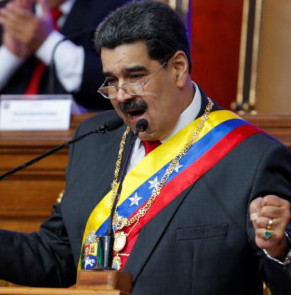President of Ukraine Petro Poroshenko presented his electoral program titled "A Great State of Free and Happy People" at the Open Dialogue forum in Kyiv on February 8. The incumbent Ukrainian leader described five spheres the development of which would enable him to bring the country out of the present-day crisis in the next five year, if he is elected president. He said that in the next five years Ukraine must become Europe's leader in the agriculture sphere, the world's top-five country in the IT sphere, the regional industrial development leader and Eastern Europe's transport hub.
Poroshenko is certain that Ukraine would become one of the ten most visited European countries under the motto "Fashionable Country That the World Opens." Moreover, he vowed that each village would be connected to the Internet, stated that there was "a strategy of overcoming poverty" and promised to repair roads in order to boost Ukraine's attractiveness for tourists and bring dozens of billions of investments into the economy. The national aircraft and shipbuilding industries should be relaunched. As a result, Ukraine will be a leader of the new technological wave. Finally, if elected, he expects to apply for the EU membership in 2023 and then to NATO. Ukraine will join this organization as "a regional leader that protected Europe from Russia," he said. In his opinion, only as a member of these organizations Ukraine will be able to feel really independent, while the membership in them will give an additional impetus to Ukraine's investment attractiveness.
Poroshenko labeled his opponents as populists and the puppets of the enemy, meaning Russia, and noted that if they came to power, they would destroy everything that the incumbent authorities strived to build.
Speaking of the economic part of Poroshenko's electoral program, it is worth mentioning that he persisted with the "slogan style" he had used during the 2014 electoral campaign. The new program still lacks concrete "landmarks" of what he is going to achieve by 2024 and what he can be later held to account for. There was almost no concrete figures in his speech. He "just" said that his strategy was designed for decades and that his goal was to form "a great European power of happy people," and this road was quite long because the economy had just started to modernize, as its development had been hindered by "the war and aggression of Russia."
As for economic development priorities voiced by Poroshenko, the main mechanism of implementing the plan of developing agricultural export is the Ukraine-EU Free-Trade Zone Agreement for which Ukraine had abandoned the CIS free-trade area. As a result of the agreement, Ukraine is now selling more goods to the EU rather than to Russia. But there are a lot of details that, if made known to the Ukrainian public, would make even patriotic people indignant. These details made Verkhovna Rada member Viktor Bondar on December 14, 2018 accuse on the air of the NewsOne TV channel the EU of deceiving Ukraine when trade agreement had been signed, as Ukraine enjoyed quotas for delivering its goods to Europe that were exhausted in the first two or three months of a year and did not enjoy conditions for creating competitive industries, thus making it buy its products. Ukrainian statistics prove this. In almost two weeks of January 2018, Ukraine exhausted all its main and additional quotas for exporting wheat, corn, honey and several types of juices. The withdrawal from the CIS free-trade agreement made Ukraine lose almost $30 billion in export revenues annually, whereas broader supplies to Europe were unable to cover even a part of the incurred losses. Europe clearly protected its own interests and Ukraine lost. So, opportunities for a breakthrough on this track are evanescent.
Kyiv linked a multiple growth in investments into Ukraine to the signing of the free-trade agreement with the EU. However, the EU leadership repeatedly said that Kyiv should get rid of extreme corruption and put its legislation in order prior to improving investment climate. But the incumbent Ukrainian authorities are not ready for this. And Ukrainians' hopes are so far not the reality.
Assessing prospects of developing the IT industry, it is worth mentioning that its share in the GDP stood at 4% last year, while the export of IT services amounted to $3.6 billion. But only one part of the IT industry is well developed in Ukraine, and that is outsourcing. Two other elements, software coding and hardware production, are poorly developed. And the share of Ukrainian outsourcing services is hard to be seen on the global scale. The volume of Ukraine's outsourcing market is three times smaller than India's and seven times smaller than the United Kingdom's, and both countries are not global leaders. Actions of the current Kyiv authorities, as Ukrainian specialists say, are in fact "ousting the industry to foreign countries." The main problem of Ukraine's IT industry is the absence of staff. Specialists have actively moved to safer countries over the past several years. And they will keep leaving and Ukraine will be without IT as a base for economic growth until the only people who give bribes are equal before the law.
After Kyiv ruptured economic ties with Russia, all big companies in the aircraft and shipbuilding industries actually have gone bankrupt, for example the Mykolaiv Shipbuilding Plant, or are close to becoming bankrupt, for example Antonov and Motor Sich. In fact, the current Ukrainian authorities destroyed these once globally competitive industries themselves and Poroshenko's mentioning them as economic growth engines looks at least strange.
Moreover, in Poroshenko's opinion, Ukraine has another enemy in addition to Russia, and that is poverty. He didn't mention in his electoral program "unpleasant moments" related to the policy of his administration aimed at combating poverty. And this was the priority of the economic part of Petro Poroshenko's electoral program in 2014 that sounded brightly and concise – "Live Well-off!"
Speaking about results of four years of "combating poverty", it should be said that, according to the Ukrainian State Statistical Service, the price of a social basket of 23 food products grew 105% from 450 hryvni in December 2014 to 923 in December 2018, while prices for social food products, such as onion, carrot, beetroot, potato, cabbage, and rye bread, grew 500%. Prices for meat and eggs almost doubled. Dairy products grew 2.2 times in prices. Just buckwheat got cheaper, but only 6%. Electricity prices more than tripled. Hot water got 3.3 times more expensive, while gas prices grew sevenfold. Housing costs grew 3.5 times on average, while pensions went down from 86 euros to 36 euros. As a result of this combat against poverty many Ukrainians are struggling, and the number of people living below the poverty line grew from 12% to 25%.
So, socio-economic reforms have so far been futile, and the Western-style modernization has not worked in Ukrainian conditions. Ukraine is officially recognized as Europe's poorest and the most corrupted country, and it is the last in terms of GDP per capita among CIS countries.
Assessing results of Poroshenko's activity as president, Ukrainian political analyst Ruslan Bortnik noted that "the ever growing number of sane people understand that he fulfilled almost none of his multiple electoral promises made five years ago. Even the most "blind" advocates of the Maidan "revolution" see that Poroshenko's "reforms" are bringing the country to chaos, while Europe is tired of repeating that it doesn't see Ukraine as its part even in the most horrific and fantastic dreams. That is why Poroshenko's vain wishes can inspire rather callow people whose number is falling every day in Ukraine." Another Ukrainian political analyst, Andriy Zolotaryov, sees eye to eye with Bortnik, saying that the economic part of the incumbent president's electoral program is directed to the past and is aimed at turning an industrial country into an agriculture village.









